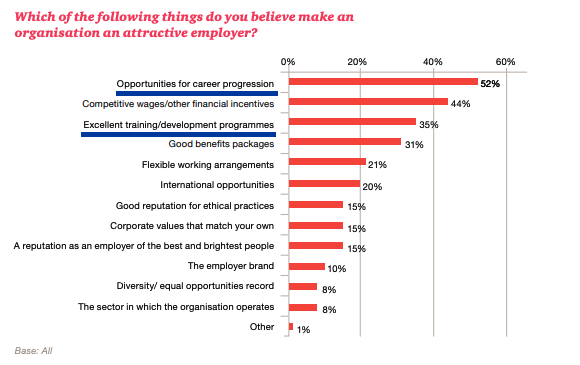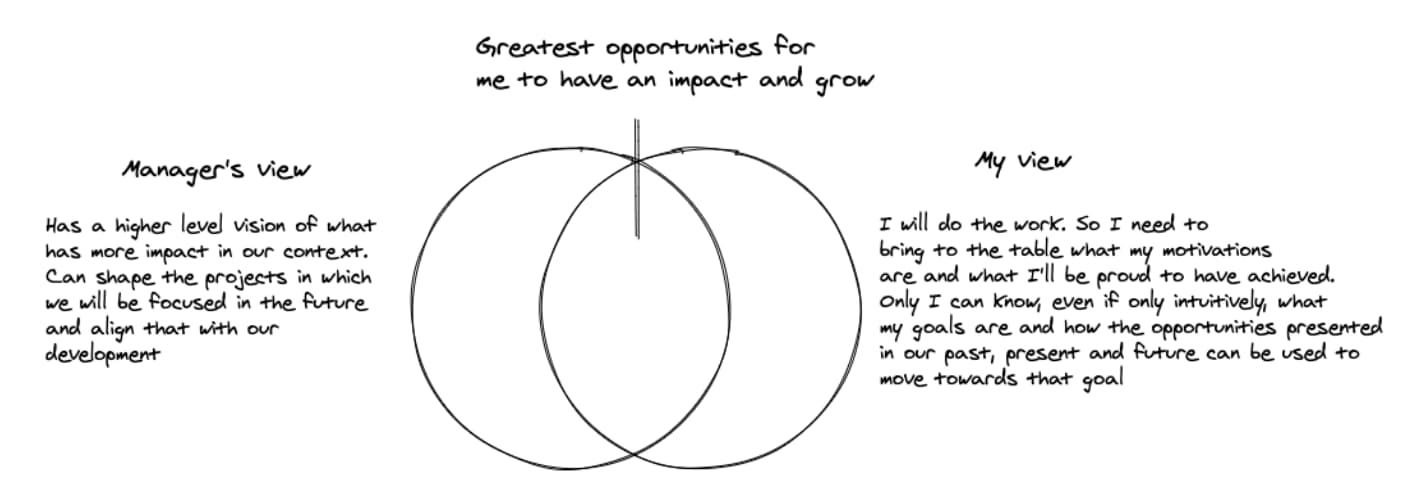Are you managing yourself?
Do you feel like your manager and your company are not helping you grow? You’re not alone. A study by PwC shows that the number one thing people look for in a place to work is Opportunity for Growth and development.
 People are seeking to grow and develop themselves
People are seeking to grow and develop themselves
Most people are looking to grow but aren’t finding that in their current employer. It’s quite common for us to suffer in silence about this. To fight silent fights while waiting for something to change. We assume that since this is happening right now in this company with this manager, it won’t change. Some people react to this either by job-hopping or by laying dormant and stagnating their careers. I want to offer an alternative: drive your own career growth.
Before going into that, let me address the obvious pushback that may have appeared in your head: “Isn’t that my manager’s job? Don’t I have a bad manager if this is happening to me?” You just might. And you’re right. It is your manager’s job. I don’t want you to keep hammering on in a place where you can’t find growth. If things are keeping you down and not showing signs of improvement, by all means, change companies. What I do want is for you not to have any moment in your career where you look back and have nothing relevant to show for. Regardless of whose job it is, your career stays with you, so you need to own it. Managing yourself will help you even more if you have a great manager, and it might be the nudge your manager needs to start helping you out more 😉.
Think about what you want
Your manager can understand what are the best opportunities in the team or in the company. She can provide feedback on your areas of learning and development. But she will never know what’s going on in your mind. She doesn’t know how you feel about the work in front of you. If you’re happy or not. If you’re feeling stuck or not. It doesn’t matter how long you’ve been in the market, the responsibility of figuring out what you want to do, what you want to learn, and what will make you happy rests on your shoulders.
Do your homework and figure out what you want and what drives you. You don’t need 5 or 10 year plans, you just need to know what sparks your curiosity, what makes you feel proud about the work you do. Use your manager, or a mentor to discover the greatest opportunities around you, but understand yourself, don’t jump into something you know won’t keep you interested.
People don’t talk about this a lot, but knowing your boundaries is an important part of knowing yourself. Understand what’s not negotiable for you, what makes you unhappy, what makes you uncomfortable.
 Finding the Nirvana of cool projects that drive our career isn't easy, but it's possible
Finding the Nirvana of cool projects that drive our career isn't easy, but it's possible
Get in the driver’s seat and start driving
Break-down the goal into milestones. Bring agendas to your 1-1s with your manager that clearly show your priorities and ask for candid feedback and guidance. Let your manager and people around you know what you’re trying to grow on. If your manager isn’t the best person to help, look for other places. Seek feedback and mentoring. Study frequently and dive deep into the things you do.
Communicate. If you are unhappy, say something. If you’re blocked, ask for help. If someone crossed one of your boundaries, let them know right away. If you want to get promoted, ask how you can get it. This last one is one that people pushback a lot on: “I shouldn’t have to discuss this. If I deserve a promotion, I should get one.” Agreed, in an ideal world, people would have all the signs and be fully aligned with your timeline on the promotion, but that’s not what happens. You may have a different view of what the next level means. Your manager may disagree that the projects you’re doing are enough to bring you to the next level by the next cycle. Wouldn’t you want to know right away if those two views are different? Ask. Communicate.
I get it that asking for help, for input… for things, in general, is not easy. It hurts. But not getting those things hurts more. You won’t get everything you asked for. But you will get some, and that will make you move faster. Do everything you can to move towards your goal.
Be proactive about solving problems
Both interpersonal and technical problems will appear. A person with strong self-management skills is skillful not only in identifying those but also in solving them. Understanding the goals and context of your team and of the company helps a lot in doing this.
If you see something that’s hindering you or the team, bring attention to it, suggest solutions and bring them to the team. Imagine worst-case scenarios and get ahead of them. Think about the context of what you’re doing and see if you can expand it to solve a larger problem for the team or the company. Doing this consistently will yield great results to your career. Be brave.